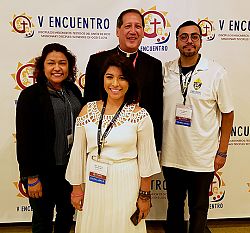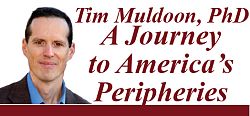The Impact of the Encuentro

From Sept. 20 to Sept. 23, some 3,000 delegates from the dioceses of the United States gathered outside of Dallas for a massive event that reflects an important development in the U.S. Catholic Church. The Encuentro, meaning “Encounter,” was the fifth major gathering of Hispanic Catholic leaders since the first one in 1972. Catholic Extension has been a proud supporter of several of the people who spoke at the event, and it has also supported several offices of Hispanic ministry in dioceses that sent delegates.
Hispanics – the majority of whom were born in the United States – represent about 4 out of 10 U.S. Catholics today, and perhaps more significantly they represent a majority of Catholics under 18. Yet the leadership of the Church in this country remains predominantly of non-Hispanic, European descent. At present, only 10 percent of bishops and 3 percent of priests are Hispanic, though those numbers will increase slightly with the growing numbers of young Hispanic priests and seminarians. To see the real growth in Hispanic Catholic leadership, one must look at lay men and women, whose numbers are creeping toward half the total number of students in lay formation programs.
That growing reality – of a Church led by young lay men and women (the average age of Hispanic Catholics is 27) – was evident at the Encuentro. The convention center was filled with the faces of young people who were nominated by their dioceses to represent the interests of the people among whom they pray, study scripture, celebrate the sacraments, and serve in their ordinary family-centered lives. I spoke with several of these leaders to learn how they perceived the impact of the Encuentro.
One woman, Junuee Castro, serves as the director of Youth and Young Adult Ministries for the Diocese of Salt Lake City. She points to the ways that the Encuentro process has unfolded over the past 40-plus years as a sign of hope for the U.S. Church. Specifically, she calls attention to the theme of missionary discipleship that was so prominent at the gathering – that is, of going out to the margins in order to embrace people from all paths of life. She reflects on her particular role of walking with young people in a mission diocese, “humbly being a prophetic voice for the most vulnerable,” encouraged by the presence of so many other young people at the Encuentro who share this vocational call.
Another woman, Jessica Maciel Hernandez, serves as the coordinator of Hispanic Youth Ministry for the Diocese of Des Moines. She points to the way that the Encuentro offered members of the Hispanic community to have a voice at the national level. Many, like her, are immigrants, and she found hope in the spaces for open dialogue about immigrants’ walk of faith and building God’s kingdom. She sees richness in the faith traditions of people’s various countries of origin, and has hope for the ways that immigrants can share these traditions with other Catholics.
These voices, as well as several others I encountered, used language about the Church in the United States which reminded me of the opening lines of Gaudium et Spes, the document from the Church’s Second Vatican Council some 50 years ago, which steered the world Church on a course of careful attention to people’s joys and hopes in everyday life. The Council, a gathering of all the world’s bishops, described a Church attentive to “the joys and the hopes, the griefs and the anxieties of the men and women of this age, especially those who are poor or in any way afflicted.” The delegates at the Encuentro are leaders who are immersed in the joys and griefs of their friends, neighbors and fellow Catholics, listening as they bring them all before Jesus and, in many cases, the Virgin of Guadalupe. Their model of the “poor church of the poor” – to echo a memorable phrase from Pope Francis – is one that will humbly yet powerfully shape the future of the U.S. Church.
Tim Muldoon, PhD, serves as the director for mission education at Catholic Extension.
© Copyright 2024 The Diocese of Salt Lake City. All rights reserved.


Stay Connected With Us